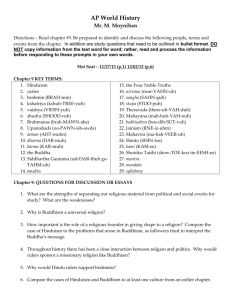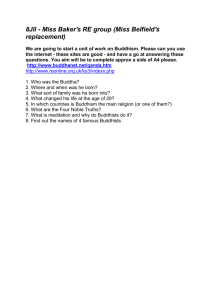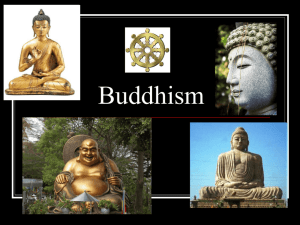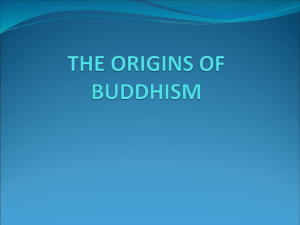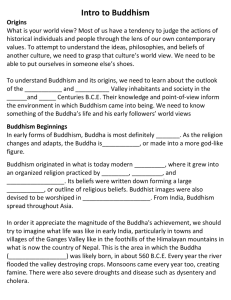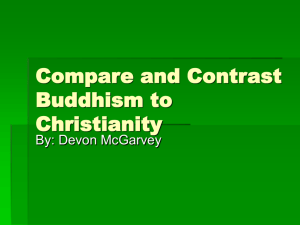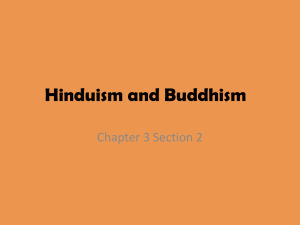Buddhism - College of the Holy Cross
advertisement
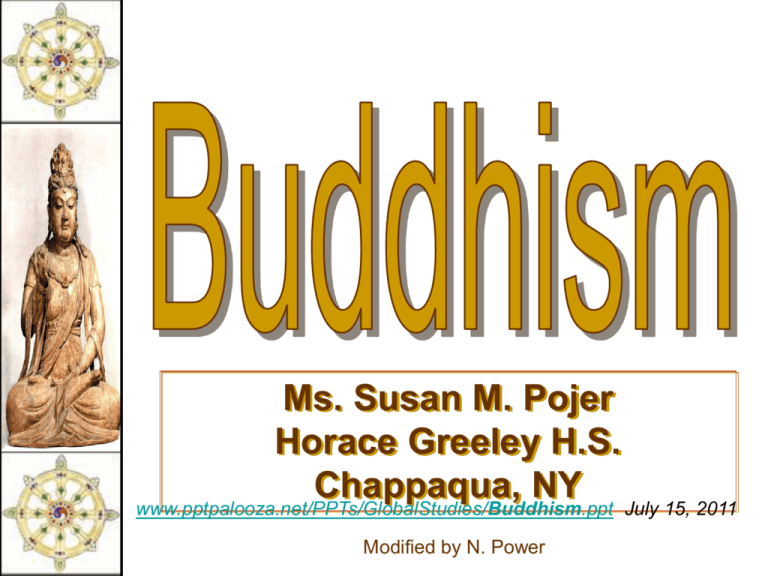
Ms. Susan M. Pojer Horace Greeley H.S. Chappaqua, NY www.pptpalooza.net/PPTs/GlobalStudies/Buddhism.ppt July 15, 2011 Modified by N. Power Buddhism in the Subcontinent The essence of Buddhism The “middle way of wisdom and compassion.” 2,500 year old tradition. The 3 jewels of Buddhism: Buddha, the teacher. Dharma, the teachings. Sangha, the community. Siddhartha Gautama (563-483 BCE) The historical Buddha, or Shakyamuni Buddha Born in NE India Raised in great luxury to be a king. At 29 he rejected his luxurious life to seek enlightenment and the source of suffering. Lived a strict, ascetic life for 6 yrs. http://www.bing.com/images/searc h?q=shakyamuni+buddha&view= detail&id=CA6783CE858E491045 B9D660975B31CA7664FE53&firs t=0&FORM=IDFRIR July 15, 2011 Rejecting this extreme, sat in meditation under a bodhi tree, and found nirvana. Became “The Enlightened One,” at 35. What is the fundamental cause of all suffering? Desire! Therefore, extinguish the self. Four Noble Truths 1. There is suffering in the world. To live is to suffer. (Dukkha) Four Noble Truths 2. The cause of suffering is selfcentered desire and attachments. (Tanha) Four Noble Truths 3. The solution is to eliminate desire and attachments. (Nirvana = “extinction”) Four Noble Truths 4. To reach nirvana, one must follow the Eightfold Path. Eightfold Path Nirvana The union with the ultimate spiritual reality. Escape from the cycle of rebirth. Buddha’s head: Pakistan Mandala: Wheel of Life Motif Types of Buddhism in the Himalayas Theravada Buddhism Mahayana Buddhism Tibetan Buddhism Theravada Buddhism The oldest school of Buddhism. The “Way of the Elders” or the “Small Vehicle.” Found in southeast Asia, including Burma (Myanmar). The monastic life is the best way to achieve nirvana. Focus on wisdom and meditation. Goal is to become a “Buddha,” or “Enlightened One.” Mahayana Buddhism Seek guidance from Boddhisatvas, enlightened beings who choose to return to the world to help people. Goal: The enlightenment of all humanity through self-sacrifice of those enlightened few. Focus on lay people, not just monks, reaching enlightenment. Seated Boddhisatva – 16c Bhutan bodhisattva Bodhisattva • An enlightened being who chose to return to the world to help other beings instead of staying in Nirvana. • Prominent in Tibetan Buddhism. • The most commonly revered bhodisattva in Tibet is Avalokiteshvara. Tibetan Buddhism A specialized form of Mahayana. Also called Tantric, Vajrayana or the Diamond Vehicle. Tantric refers to scriptures that describe rituals. Focus on Boddhisatvas who help lay people. Involves chants and rituals. Rituals include a bell and a vajra. Traditionally, monks & lamas are men, not women. • The bell symbolizes wisdom and the vajra symbolizes a thunderbolt and an indestructible substance. http://www.bing.com/images/search?q=vajra&FORM=BIFD July 27, 2011 • Tibetans also use rosaries, prayer wheels and prayer flags to pray. http://www.bing.com/images/se arch?q=Tibet+prayer+wheel&vi ew=detail&id=33E2BAF0215C 573EA69B41268FF203FA38B 4E4AA&first=211&FORM=IDF RIR July 27, 2011 http://www.bing.co m/images/search?q =Tibetan+rosary&vi ew=detail&id=2D62 F594F717AA020FE C2D62F594F717A A020FEC&first=0 July 27, 2011 • Next slide: http://www.bing.com/images/search?q=Tibet+prayer+flags&view=detail &id=A5C717F611AE65758793061556158697FE68AD3F&first=0&FOR M=IDFRIR July 27, 2011 Activity: make prayer flags Divide students into small groups. Each group gets the same size piece of cloth but in different colors. The students design and decorate their flag with a prayers of gratitude and/or requests. They may include pictures. Glue all the flags to a string and hang the flags in the classroom or outside. funerals • Two ways to free the deceased: – Cremation – Sky burial In sky burial, the flesh is cut off of the and vultures come and take the flesh Sky Burial http://www.bing.com/images/search?q=Tibet+%22sky+burial%22&view=detail&id =EEE30981859FA886BAC3EE4F9F43F9676BF2D01C&first=0 July 28, 2011 The 14th Dalai Lama • Watch the film “Unmistaken Child’ stupas • Objects of a special shape that contain relics of the Buddha or famous lamas • Range in size from fitting in the palm of your hand to large buildings http://www.bing.com/images/search?q=stupa&view=detail&id=C4FEC524EC A1E09B6C864CB5236DDC06A5E59BD8&first=31&FORM=IDFRIR July 27, 2011 Activity: make stupas using stupa molds, clay and rice. • Order stupa molds from: http://www.tibetanspirit.com/shopdisplayproduct s.asp_Q_id_E_166_A_cat_E_Tsa+Tsa+Molds_ A_catid_E_136_A_maincat_E_Ritual+Items Directions for making stupas • Rub oil into the inside of the stupa mold. • Fill the mold with clay and then turn the clay inside the mold until it spins smoothly. • Insert a grain of rice into the bottom. • Remove the clay from the mold by sticking clay on the end and pulling the clay out.


